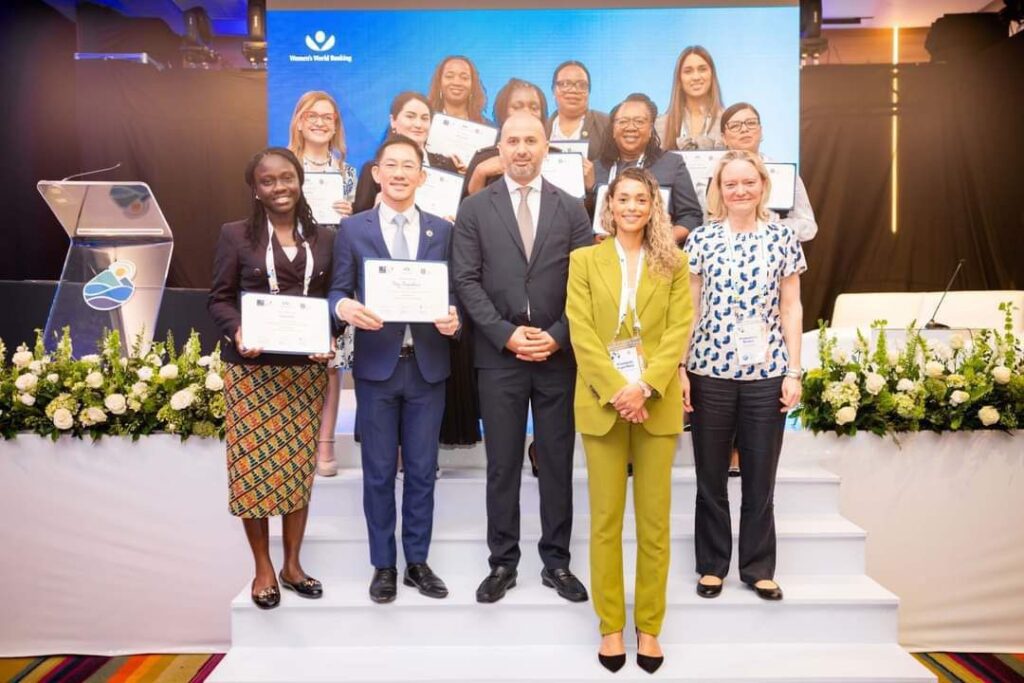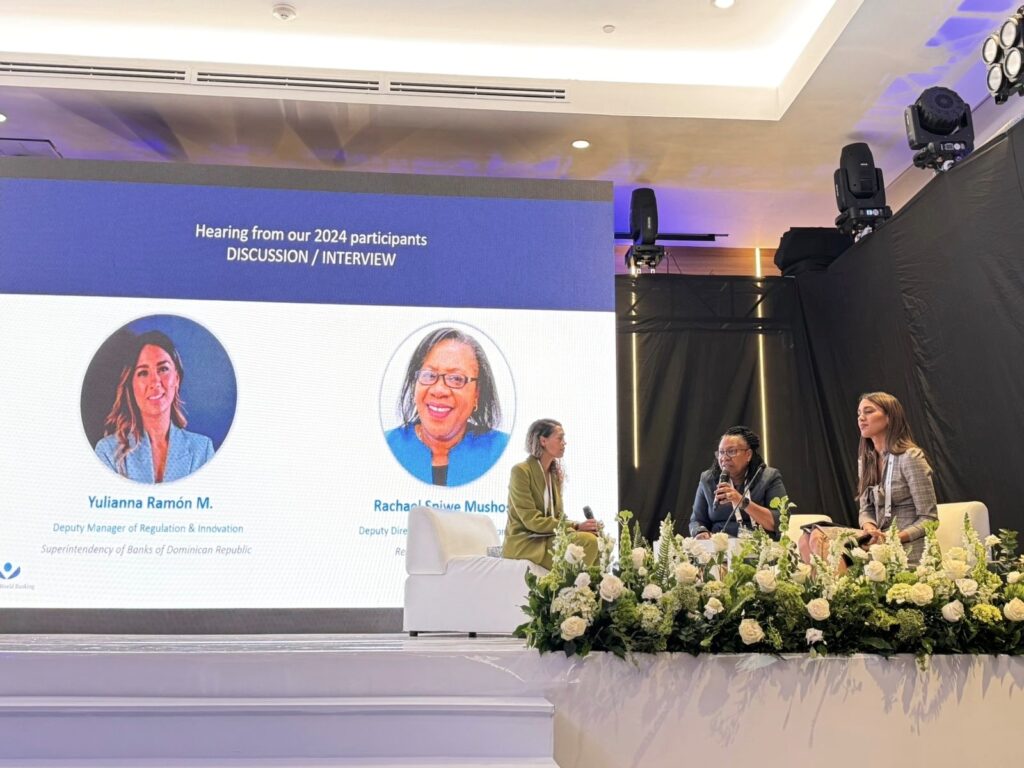The 2024 Alliance for Financial Inclusion (AFI) Global Policy Forum, held in El Salvador between 2 – 5 September, was a week of rich discussion and collaboration. The highlight of the event for Women’s World Banking, was the Leadership & Diversity Program for Regulators (LDR) graduation ceremony on the morning of 3 September, a moment that showcased the hard work and commitment of our participants and the significant potential for future gender diverse leadership in financial regulation.

From left to right back row: Inés Paez – Superintendency of Banks of Dominican Republic, Adolat Sharipova – National Bank of Tajikistan, Jean Couvaras-Kamanga – Bank of Zambia, Locadia Chaavure – Reserve Bank of Zimbabwe, Shirley Middleton – Office of Supervisor of Insurance and Private Pensions, Belize, Rachael Spiwe Mushosho – Reserve Bank of Zimbabwe, Yulianna Ramόn – Superintendency of Banks of Dominican Republic , Arifah Bautista – Office of Supervisor of Insurance and Private Pensions, Belize
Opening Remarks from an Inspiring Leader
The graduation kicked off with an impactful keynote address from Deputy Governor, Felicia Dlamini Kunene, from the Central Bank of Eswatini and a proud alumna of the LDR program. DG Kunene’s remarks resonated deeply with the audience, as she highlighted the critical importance of gender-inclusive policies in financial regulation and their broader impact on economies.
Felicia Dlamini Kunene emphasized that financial inclusion is not a zero-sum game; empowering women to participate in financial systems does not detract from men’s roles. Rather, it is about ensuring that all segments of society can contribute to economic growth. A poignant moment in her speech was when she shared Eswatini’s journey toward incorporating women’s financial inclusion (WFI) explicitly into their national strategy. While legal barriers to land ownership for women were removed in 2005, traditional and social structures remain a challenge, underlining the importance of financial, economic, and legal literacy for women. “If we exclude women from the financial system,” she stated, “we stifle not only their development but also the development of our countries.”
Her call to deliberately focus on gender in financial policies was an empowering reminder of how targeted initiatives can accelerate progress. But she also underscored the need for multi-sectoral approaches that involve men, and consider social and cultural issues alongside financial policy.
Capstone Presentations: Insights & Innovations
The program continued with capstone presentations from participating institutions in the 2024 LDR cohort. Each project focused on advancing women’s financial inclusion or leadership, highlighting the diverse strategies being deployed across different countries.
- The Bank of Zambia explored ways to bridge the gap between formal financial service providers (FSPs) and informal savings groups (ISGs), which are favored by women. With nearly 800,000 Zambian women involved in ISGs, there is a significant opportunity to formalize these networks to improve access to capital and reduce predatory lending practices.
- The National Bank of Tajikistan presented their national strategy to support women-led MSMEs, anticipating that nearly 30% of women-owned businesses will benefit from initiatives such as lower interest rates and simplified loan documentation. Their efforts to enhance women’s access to finance underscore Tajikistan’s commitment to gender equality in entrepreneurship.
- The Reserve Bank of Zimbabwe shared its vision for building a pipeline of women leaders within both the central bank and the wider financial sector. They noted that while 83% of women now have access to financial services, usage remains low. Increasing the number of women in leadership roles is seen as key to designing products that better meet women’s needs – a theory we are hoping to see proven in the future by their performance indicators.
- The Superintendency of Banks of the Dominican Republic outlined their efforts to close the gender gap in financial inclusion, which has widened in recent years. Their strategy uses behavioural economics tools, publicly sharing performance of banks and creating competition to encourage FSPs to offer more gender-conscious products. They aim to increase women’s participation in the financial system by 5%, reaching an additional 175,000 women by 2025.
- The National Insurance Commission of Ghana shared their plan to mandate a minimum of two women on insurance company boards by 2030. The policy, which is in the form of a Directive is tied to the Insurance Regulations which is currently laid before Parliament. Enforcement is expected to begin by June 2025, with full implementation by 2030.
- The Office of the Supervisor of Insurance and Private Pensions, Belize, presented their initiative to improve financial literacy among women-led MSMEs, with a particular focus on insurance. The project has already been revised through a series of roadshows, allowing for greater collaboration with the Central Bank of Belize and other government entities. This expanded the scope to broader MSME support beyond insurance, with the goal of achieving 5% growth in small women-led MSME ownerships.
These capstone projects exemplified the LDR program’s role in fostering innovation, collaboration, and gender-focused reforms within financial institutions. We are excited to hear about the work and change they are planning for the women in their countries and the impact they expect to have.

Reflections from the 2024 Cohort
During a special interview session, we heard from Yulianna Ramόn, Deputy Manager of Regulation and Innovation, and Rachael Mushosho, Deputy Director for NFIS and Micro Finance Institutions, who both shared their personal journeys on the LDR program. Yulianna, motivated by the credibility and global reputation of the LDR program’s partners, spoke of her heightened conviction to drive purposeful change.
“When you want to have an impact, you need to be intentional,” she said. “Things won’t change if we just wait for them to take due course.”
She encouraged her peers to be multipliers of innovative ideas, driving change across their organizations.
Rachael echoed this sentiment, discussing the importance of mindset in achieving goals. She acknowledged that the journey toward gender parity in financial leadership is often met with resistance but emphasized the need to focus on the ultimate goal rather than the obstacles. She also pointed out the risk of mismatch between policy implementation and practice, noting that change often requires male counterparts to understand and support gender equality initiatives and highlighted the importance of embedding these practises so that policy ‘stands the test of time’.
Looking Ahead
As the event came to a close, the 2024 LDR graduation was a powerful testament to the program’s success in nurturing diverse leadership. The enthusiasm and determination of the cohort, paired with the tangible outcomes of their projects, signal a future where gender equality in financial regulation is not only possible but inevitable.
The graduation was not just a ceremony—it was a call to action for all involved to continue pushing boundaries, driving inclusive policies, and championing the leadership of women in financial regulation across the globe.
A special thank you goes to our program funders, the Swiss State Secretariat for Economic Affairs (SECO) and Visa Foundation for making this program possible.



